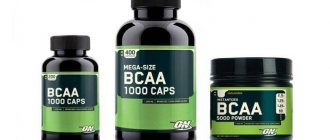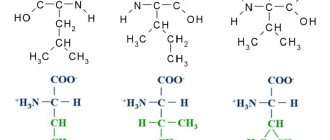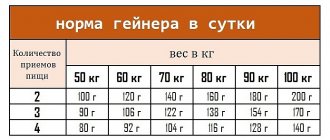Sports Nutrition > Library > Protein and BCAA taken together
When you're trying to get the most out of every workout and prioritize muscle hypertrophy, the first thing you need to think about is whether you're getting enough protein. It is necessary for muscle recovery and growth. And here the questions arise: what is protein, what are BCAA amino acids, is it necessary to combine their consumption, how to achieve the best result? Many studies suggest that supplementing protein with BCAA may provide better results. Is it so?
What is protein
From a biochemical point of view, protein is a biologically active substance consisting of structural building units - amino acids.
Protein is a macronutrient and must be ingested daily in relatively large quantities, along with food.
Protein is the main building material for muscles. Its lack in the diet leads to a slowdown in muscle growth or its complete stop.
With a critical lack of protein, the human body begins to “eat” itself. The processes of catabolism develop - the breakdown of tissues, including muscle.
With regular strength training, intake rate doubles and is 2 grams per 1 kg of body weight per day.
There are proteins of animal and plant origin, which can be supplemented by taking a food supplement obtained artificially from the same products - protein.
Protein as sports nutrition comes in the following types:
- Whey “fast”
- Casein “slow”
- Egg
- Beef
- Vegetable
- Combined (4-6 types listed above)
Which is better: BCAA or protein: basic information
Protein is present in every living organism. Therefore, it is found in almost all food products. But is this amount enough? If you are planning to start exercising, it is very important to get enough protein as it helps with muscle recovery after exercise.
According to the National Institutes of Health, the daily value is calculated using the following formula: 0.36 g of protein per 1 pound (=453 g) of body weight. But if you exercise regularly, this number increases to one gram or even more. Namely: 1 g of protein per 453 g of body weight.
That is, our body mainly consists of protein, which in turn consists of amino acids. Figuratively speaking, they are like microscopic Lego pieces. There are 20 amino acids that the body cannot do without. Nine of them are essential. This means that the human body does not produce them on its own. For this purpose, a special healthy diet is required.
Nutritional supplements containing proteins and amino acids have many beneficial properties. They help with muscle recovery after exercise and reduce fatigue. Therefore, it is very important to take these foods after a grueling workout.
Pros and cons of BCAA
Let's look at how BCAA is more effective than protein and what benefits the supplement can provide to athletes:
- Fast absorption rate (pre-digestion is not required when entering the stomach);
- Does not contain fats or carbohydrates;
- Ideal for quick protection against catabolism;
- Increases the rate of muscle recovery compared to regular protein.
These benefits are extremely important for fitness and any type of strength sports, but do not forget about the disadvantages of BCAA, which include:
- Increased cost;
- No other amino acids;
- Not suitable for daily use or daily protein intake.
Pros and cons of protein
The most important and primary advantage of protein is the ratio of effectiveness and cost. No other supplement can beat whey protein in this regard. Other benefits of protein include:
- Whey protein contains the most complete amino acid profile;
- Significantly superior to BCAA in taste;
- It has a high anabolic effect that lasts up to 2 hours.
Among the disadvantages of protein, it is worth highlighting only the presence of fats and carbohydrates in the composition.
, but this feature directly depends on the manufacturer. Some brands use a high degree of purification of raw materials, which is why a serving contains less than 1 gram of fat (can reach 0) and no more than 2-3 grams of sugars, which are present in the form of flavors and sweeteners. For some manufacturers, the amount of carbohydrates can reach up to 4-5 grams, as well as 2-3 g of fat.
What is BCAA
Among the variety of amino acids, BCAAs are definitely in first place in terms of importance for muscle growth.
They contain three amino acids - valine, leucine and isoleucine.
They are classified as essential, that is, those that are not synthesized in the body independently. About 30% of muscle tissue consists of them.
The term comes from the English Branched Chain Amino Acids - amino acids with branched side chains.
With their help, various biochemical reactions occur in the muscle cell:
- Restoring muscle microdamage after strength training
- Increased physical performance during the lesson
- Act as an alternative source of energy in the muscle cell
- Protect muscles from breakdown
- Participate in the synthesis of other amino acids (glutamine, alanine)
The largest amount of BCAAs is found in natural protein products of animal origin. Vegetable protein is inferior in this indicator.
With intense power loads, the body's need for BCAAs increases. To ensure their supply in the required quantity, bodybuilding has adopted additional intake of this substance in the form of a dietary supplement.
According to the release form, there are powder, tablets, capsules and liquid forms. With their advantages and disadvantages, they all provide approximately the same effect.
What are BCAA
The term BCAA or branched chain amino acids refers to three specific essential amino acids called leucine, isoleucine and valine. They play a key role in muscle protein synthesis, providing muscle energy and maintaining lean muscle mass. All three can be found in any BCAA sports supplement.
To lose weight, you need to significantly reduce your calorie intake, while the body tries to conserve its fat reserves and begins to break down muscle for energy production. Taking BCAA allows you to burn fat without destroying muscle tissue.
This is the biggest benefit of BCAA's for those on a low calorie diet. Research has shown that using branched chain amino acids has a number of training benefits, including:
- gain muscle mass>;
- promotes recovery after training;
- reduces natural serotonin levels.
Composition bcaa
Isoleucine - takes directly
participation in cellular processes, being the most valuable source of energy for muscles. A lack of this amino acid in the body leads to loss of muscle mass, lethargy, drowsiness and low blood sugar levels.
Leucine is extremely important for proper muscle growth and construction. Responsible for the formation of protein in muscles and liver, protects protein molecules from destruction. In addition, this amino acid maintains serotonin levels at a consistently high level, as a result of which the athlete’s body is less susceptible to fatigue. Leucine can also be a source of energy for muscles.
Valine is also a BCAA amino acid and is an energy source for muscles. Like leucine, this amino acid maintains serotonin levels at a consistently high level, making the athlete's body less susceptible to fatigue.
The complex includes 3 amino acids. The proportions of BCAA protein are based on the rate of absorption of each in a 2:1:1 ratio. The faster they are absorbed, the better the anabolic effect. The advantage of BCAA is that the body receives molecules that are broken down into peptides, which instantly penetrate into skeletal tissues. This has a positive effect:
- on the quality of training;
- increasing strength;
- formation of lean muscle mass.
Functions of BCAA amino acids
They always perform the same function, regardless of their source.
These three branched amino acids are released by the liver after protein is digested. From there they go to:
- Muscles
- Brain
- Heart
- Kidneys
- or remain in the liver.
But most of the BCAA is used by the muscles. Therefore, they are relevant as a supplement for gaining muscle mass.
During exercise, amino acids are catabolized and broken down. This increases a person's need for BCAAs if they engage in intense or strength exercise.
Other amino acids are eventually also used, but for the synthesis of enzymes or hormones.
More is not better, especially in the world of supplements. If there is more of one amino acid in the body than another, the excess is converted into ketones, fatty acid or glucose. It's bad, but not very dangerous.
What are the benefits of BCAA amino acids?
This is an important question. This can be answered in two ways.
- You will get more if you cannot take protein for some reason, for example, you have an allergy or a strict diet. Then BCAA will really help you build muscles. You will also recover faster after training, so in this case, BCAAs will be useful.
- But if you're already taking protein, you'll get minimal benefit from BCAAs. Your muscles can only consume a certain amount of BCAAs. The excess will turn into fat or glucose, making the supplement a waste of money.
What is the best thing to take after a workout?
Essentially, BCAA is the same protein found in any protein shake.
But after strength training, it is very important to ensure the rapid flow of plastic material into the muscle cell. And here amino acids in the form of a separate supplement are in the lead.
Taking BCAAs is recommended 10-15 minutes before the end of your workout. This is exactly how long it takes to absorb it if the stomach is empty.
As for the BCAAs contained in whey protein, their absorption rate is slightly slower. There they are mixed with other types of amino acids, as well as carbohydrates and fats, which slow down this process.
EAA amino acids are responsible for stimulating muscle protein synthesis
EAA essential amino acids are the main "active" components of dietary protein. EAAs cannot be produced in the body, but they are primarily responsible for stimulating muscle protein synthesis [1]. Consumption of nonessential amino acids, with or without concomitant EAA intake, does not affect protein synthesis in healthy, well-nourished volunteers, either at rest [1, 2] or post-exercise [3, 4]. The muscle protein synthesis response following oral administration of an EAA formulation is more than twice the response following consumption of a comparable dose (g/g) of whey protein isolate [5]. The greater anabolic effects of the free form of EAA may be explained by the more rapid increase in plasma concentrations of amino acids, as well as higher peak concentrations. Additionally, EAA supplements can be developed to address altered metabolic conditions such as aging [6]. While EAA supplements have clear benefits, isolated proteins such as whey protein isolate also have potential benefits.
The protein synthesis response to the consumption of isolated dietary protein persists for a longer time than the response to the free form of EAA due to the slower absorption of its constituent amino acids [7]. Additionally, peptides produced during the digestion of dietary proteins (especially whey protein) have been suggested to have unique nutritional benefits [8,9,10,11]. Taste preferences may also favor the consumption of isolated protein foods. Thus, the concept of a nutritional composition that combines the beneficial effects of both free form EAA and isolated dietary protein is attractive.
Consumption of supplements together
The answer to the question whether it is possible to mix protein and BCAAs lies on the surface.
BCAAs are responsible for ultra-urgent (instant) muscle recovery. Therefore, it is important that amino acids are absorbed quickly and completely. To do this, it is advisable not to mix them with protein.
This rule applies primarily to post-workout use.
On rest days, BCAAs and protein can be taken together. Although here the practice of separating them by time is common.
The logic here is simple - the more often you take these supplements during the day (natural food also counts), the higher the likelihood of consistently high levels of amino acids in the blood. And this guarantees muscle growth.
How to drink protein with BCAA?
From all of the above, several conclusions can be drawn regarding the use of these two sports supplements. Firstly, taking BCAA with protein is quite advisable. For example, you can drink BCAA protein after a workout. It is better not to do this immediately after waking up, because here it is important for us to provide the body with amino acids as quickly as possible.
If you want to take only the best BCAA, then read our top BCAA rating. It has many exclusive brands that you most likely don’t even know about. A detailed review with a description of all the advantages!
You can buy BCAA using the link:
To get the maximum benefit from BCAA, you need to take them correctly. Find out how to drink BCAA correctly, we are sure it will be useful for you!
Secondly, there are no significant differences regarding the schedule between taking a separate supplement or taking two at once.
The usual example, according to which you need to take protein 3 times a day, is also perfect when combined with BCAA. The same applies to the amino acid complex: the usual recommended intake schedule is in the morning, before, during and after training. On so-called rest days, we take BCAA simply between meals.
So the plan might look like this:
Training day:
- In the morning – BCAA;
- Between meals - protein;
- Before training – BCAA;
- Post-workout – BCAA and protein;
- Before bed – BCAA and protein (preferably casein).
On a non-training day:
- In the morning – BCAA;
- Between meals - protein and BCAA;
- Before bed – BCAA and protein (casein).
Admission rules
Summarizing all that has been said, we highlight the regimen for taking protein and BCAAs:
- On training days
10-15 minutes before the start of your workout, take one serving of BCAA - 5 grams. For advanced athletes with large muscle mass – 10 grams.
This is followed by another portion 10-15 minutes before the end of the workout.
Another option for use on a training day is when the entire daily requirement (for amateurs 5-10 g, for athletes 10-20 g) is evenly distributed throughout the entire workout.
15-30 minutes after exercise, a portion of whey protein in water is recommended. This way it will be absorbed faster than with milk or juice.
You can take another serving of protein at night. Ideally, slow casein or complex.
Here it is better to dilute the concentrate with milk to increase the period of protein absorption even further. This technique helps to minimize nighttime breakdown of muscle tissue.
- On days off from strength training
It is better to start the morning with a portion of BCAAs, taking amino acids immediately after waking up, on an empty stomach. After 10-15 minutes, you can drink a portion of whey protein in water, and after 30-40 minutes, have breakfast with natural food. This way you will quickly stop night catabolism.
Take another serving of BCAAs throughout the day. As a rule, 10-15 minutes before meals. It is also recommended to take a serving before bed.
You can take any type of protein during the day. Whey or complex - it doesn’t matter, the main thing is that the intake of protein from natural products and sports nutrition occurs regularly and at short intervals.
The ideal frequency of meals is every 2-3 hours. At night you can take “slow” protein.
BCAA or protein - what to choose?
As mentioned earlier, whey is a by-product of milk. Another advantage of this substance is its low lactose content. This product is used by athletes and bodybuilders as a meal replacement before and after workouts. The whey contains 9 essential amino acids.
There is a wide selection of different types of whey protein on the market, with slight differences. For example, whey protein isolate contains a high percentage of protein - about 90%, and low fat.
Summarizing all of the above, it should be noted that you can combine BCAA with whey. This will allow you to get the maximum benefit as each product is effective in its own way. However, they cannot be mixed. BCAA's are best consumed during exercise, while whey is typically consumed post-workout. But if you wish, you can give preference to one product and get good results. If your funds are limited, take BCAA. If you want to get rid of excess fat and build muscle, consume protein after your workout.
Below are a few more important questions to consider when choosing a dietary supplement.
Efficiency
It is unfair to assume that one product is more effective than another. Keep in mind that these supplements are used for different purposes. On the one hand, whey protein helps you feel full and provides energy, which the body uses to develop muscles. On the other hand, BCAA will help you get rid of excess fat and stay slim. Try to paint a clear picture of what you really need. This will help you get the answer and determine what type of supplement you need.
Synthesis
Protein powder contains all the amino acids necessary for the body. However, it will take some time for the first visible results to appear. This is due to the fact that the process of processing the substance occurs through the liver.
On the other hand, BCAA brings faster results, since the absorption process occurs in the skeletal system. This preserves muscle tissue and prevents catabolism.
Calories
Both whey and amino acids help you gain muscle mass. But one of the main differences lies in the number of calories obtained in the process of consuming these supplements.
Keep in mind that a BCAA supplement is unlikely to add calories since the amino acids are already broken down and the body won't have to do this on its own. As for protein powder, 100g of this product will provide about 27 calories.
Prices
If you're deciding whether BCAA or protein is better, it's also reasonable to think about cost. In addition, common sense dictates that the quantity of a product purchased is directly proportional to the funds spent on it. If you want to keep your calorie intake to an absolute minimum and maintain muscle mass, choose amino acids. If you're looking to save money, you can get by with protein.
Dosage
Depending on your current weight and activity level, the recommended protein intake will vary from 0.5 to 1.5 grams per 1 kilogram of body weight. This is the daily amount of all protein consumed along with food. If it turns out that you eat a lot of meat, eggs, fish and other protein foods, it's likely that you don't need to take a supplement. Plus, unlike BCAA, whey protein may increase your calorie intake. And if you need to quickly recover after a hard workout without getting a lot of calories, then it is better to take amino acids.
As for amino acids, the body requires only 10 mg, with the exception of leucine, the recommended dose of which is 14 mg.
Bonus tip: Always check labels and watch your body weight. If in doubt, consult with specialists!
Extra sports nutrition to help you stay in shape
If you have BCAA and protein in your arsenal, that's already good! But there are several more supplements that will help you not only improve or maintain the quality of your form, but also maintain your health. These include:
- Vitamins and minerals;
- Fatty acid;
Vitamin and mineral complexes are recommended not only for athletes, but also for the average person, since food from supermarkets has long been unable to provide our body with all the necessary substances. And fatty acids will supplement your diet with healthy fats, which perform many different functions: from improving heart function to strengthening the immune system.
To increase the effectiveness of taking supplements, we advise you to learn how to take sports nutrition correctly.
The best vitamins and minerals
Puritans Pride Stress Vitamin B-Complex + Vitamin C-500 Timed Release
Price: 1330.00 rub.
Card Product
Controlled Labz Orange Triad (30 servings)
Price: 2760.00 rub.
Card Product
Puritans Pride Vitamin C-500 mg + Bioflavonoids and Rose Hips
Price: 930.00 rub.
Card Product
Go to the category Vitamin and mineral complexes »











